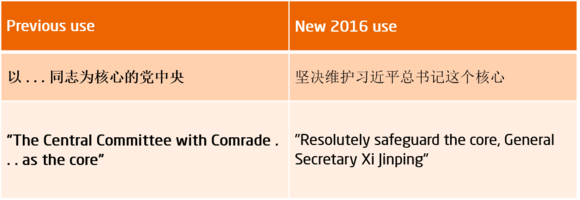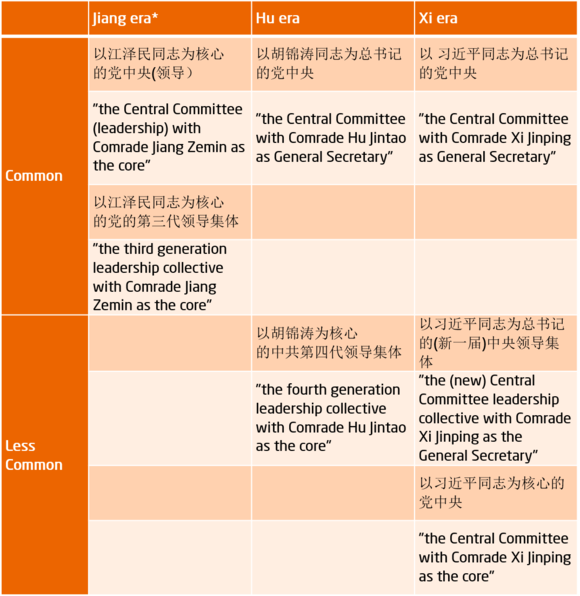Empowered or Embattled? We Don’t Know What Hexin Means for Xi Jinping
Like many other fragments of information that trickle out of the black box of China’s leadership, the new usage of the term “hexin” could mean several different—opposing—things.
Originally published on the MERICS website.
This article reflects the personal views of the author
and not necessarily the views of the U.S. Government or the Department
of State.
—
A new turn of phrase …
A sudden, novel use of the term “核心” (hexin, or “core” in English) to describe General Secretary Xi Jinping generated a stir in China-watcher circles recently. The new use appeared early in 2016, as dozens of municipal and provincial cadres employed the novel phrase (坚决维护习近平总书记这个核心, or “resolutely safeguard the core, General Secretary Xi Jinping”) in successive rounds of meetings. The actual phrase, as described in the graphic below, is slightly but notably different from previous uses of hexin to talk about China’s General Secretary.
Importantly, the central propaganda apparatus has not yet given the
phrase a public stamp of approval, such as including it in central Party
documents or in original reporting from authoritative PRC media
outlets. Yet, it is reasonable to assume that the rollout of the new
phrase was coordinated in some fashion, since it was repeated verbatim
in a rapid succession of a large number of sub-national meetings. But
it remains unclear where exactly—or why—the phrase was generated.

… and several ways to interpret it
Beijing does not generally introduce such shifts in phrasing willy-nilly, particularly when discussing the central leadership. So if this new term is a signal of changed leadership politics or priorities, what does it mean? Two common explanations use the same phrase to buttress opposing theories:
- Xi “has turned the page on crushing the cabal of senior officials who opposed his ascension” and seeks the “formidable stature once held by Deng Xiaoping.” The wording in Chinese of this new phrase does indeed feel highly personalized (the phrasing clearly puts the grammatical focus on Xi Jinping, rather than on the Central Committee leadership), and the re-introduction of the word “core” is notable.
- Xi seeks to put on a linguistic show of strength to belie the “internal opposition and party infighting” he faces in the lead-up to the next Party Congress. The term “safeguard” does call to mind the need for protection and suggests danger.
The fact that China watchers use this piece of evidence to support contradictory narratives means that additional information will be needed for a correct interpretation, and perhaps will be provided by authoritative outlets in the coming months. Whatever the ultimate origin of new phrase, it is a reminder that, because of our limited insight into Zhongnanhai, we should remain cautious about rushing to interpret official signals – especially ones that can be used to support opposing theories.
In the meantime, we should also ask ourselves which leadership precedent we are focusing on. Much of the commentary surrounding the new phrase focuses on the use of hexin (“core”) as a way for Xi to put himself on equal footing with Deng Xiaoping (either as a means of self-aggrandizement or as a way of papering over leadership weaknesses). Yet, the word hexin was initially used to describe Jiang Zemin. It was only later retroactively applied to Deng and Mao Zedong.
In contrast, the word hexin largely fell out of use during the Hu Jintao administration. Hexin was used very occasionally in Party-affiliated media, but in general, the central leadership under Hu was referred to as以胡锦涛同志为总书记的党中央, or “the Central Committee with Comrade Hu Jintao as General Secretary.” And, in many cases, authoritative PRC media still use that same phrase to describe Xi.
Leadership descriptions in Party-affiliated media

*These turns of phrase were also used retroactively to describe Mao and
Deng and continued to be used for these three leaders during Hu’s
tenure.
Therefore, the reintroduction of the word hexin in
this new phrase may signal a desire to return to pre-Hu precedent,
attempting to reassert the General Secretary’s position as a strong
leader and a centre of gravity for the country. In terms of leadership
propaganda, this would make Hu Jintao the exception, not Xi Jinping.
